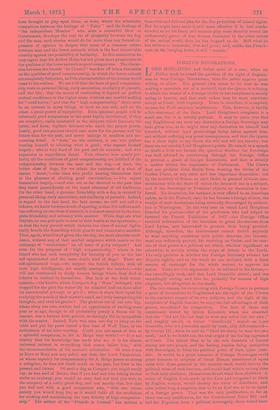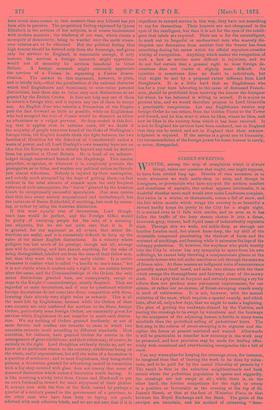FOREIGN DECORATIONS.
LORD HOUGHTON had rather more of a case, when on Friday week he raised the question of the right of English- men to wear Foreign Decorations, than the public appears quite willing to allow. The general idea seems to be that he was making a mountain out of a molehill, that the Queen in refusing to admit the wearer of a Foreign Order to her receptions is merely acting as hostess, and that such orders may be worn anywhere except at Court with impunity. There is, therefore, it is implied, no case for Parliamentary interference. This, however, is hardly a fair statement of the facts. Lord Houghton's complaint is a small one, but it is strictly political. It may be quite true that any Englishman can wear any decoration a foreign Sovereign may have given him, as he might wear any decoration he himself had invented, without legal proceedings being taken against him, and without suffering any penal consequences, and that the Queen has a clear right to say whom she will and will not receive ; but these are not exactly Lord Houghton's points. He raised, in a speech no doubt a little too formal, the question whether the Sovereign was well advised in intervening through the Foreign Office to prevent a grant of foreign decorations, and that is strictly a matter within the cognizance of Parliament. The Crown does not prohibit John Smith from wearing the Order of the Golden Fleece, or any other and less important decoration ; but by the courtesy of States, no such Order is granted without com- munication with the State of which the favoured one is a subject, and if the Sovereign or President objects, no decoration is con- ferred. No decoration, for instance, is ever offered to an American unless, as in the Peabody case, he has become a foreign citizen, the receipt of such decorations being avowedly discouraged by authori- ties at Washington. In the very case on which Lord Houghton founded his protest—that of the gentlemen who had helped to forward the French Exhibition of 1867—the Foreign Office received information of the intention to grant decorations from Lord Lyons, and intervened to prevent their being granted. Although, therefore, the Government cannot forbid anybody to wear anything consistent with public decorum, the Govern- ment can indirectly prevent his receiving an Order, and its exer- cise of that power is a political act which, whether significant or otherwise, is strictly within the scope of debate in the Lords. The only question is whether the Foreign Secretary advised her Majesty rightly, and on the whole we are inclined, with a faint reserve of contempt for the whole matter, to approve his action. There are two arguments to be adduced in his favour,— one exceedingly weak, and this Lord Granville stated ; and one exceedingly strong, and this he, probably for reasons of high etiquette, left altogether in the shade.
The two reasons for intervening with Foreign Courts to prevent a grant of decorations to Englishmen are the right of the Crown to the exclusive respect of its own subjects, and the right of the recipients of English honours to enjoy the full advantages of their grants, unmolested by competition. The first of these was imperiously stated by Queen Elizabeth when she observed that she "did not like her dogs to wear any collar but her own and roughly stated, or rather " bucolically " stated—as Lord Granville, who is a journalist spoilt by rank, ably differentiated— by George III., when he said he "liked his sheep to wear hie own mark," and is we doubt not, the real origin of the feeling expressed at Court. The Queen likes to be the sole fountain of honour among her own people, and the feeling, besides being instinctive with Sovereigns, is, from the political point of view, quite justi- able. It would be a great nuisance if Foreign Sovereigns could grant honours to subjects of Great Britain considered of equal value with those granted in the country itself, would destroy the political value of such honours, and would lead within no long time to their total abolition. Monarchists do not want them abolished. A series of English Earls made by the Czar and recognised as Earls by English society, would destroy the value of Earldoms, and raise before long a suspicion that to be an Earl was to be au agent of a foreign power. That was the only justification, so far as there was any justification, for the Ecclesiastical Titles' Bill ; and had the Popedom been a political sovereignty, there would have
been much more reason in that measure than any Liberal has yet been able to perceive. The proprietary feeling expressed by Queen Elizabeth in the services of her subjects, is of course inconsistent with modern manners ; the tendency of our race, which claims a monopoly of domesticity, being to wander over the earth where- ever salaries are to be obtained. But the political feeling that high honour should be derived only from the Sovereign, and given only for services to England, is reasonable enough, if only because the services a foreign monarch might appreciate, would not of necessity be services beneficial to Great Britain. A foreign monarch might extremely appreciate the services of a Fenian in organising a Fenian demon- stration. The answer to this argument, however, is plain, and is briefly this,—that the peculiarities of the national character which lead Englishmen and Scotchmen to over-value personal distinctions, lead them also to value only such distinctions as are granted by the British Crown. It does not help any one of them to inherit a foreign title, and it injures any one of them to accept one. An English Peer who inherits a Princedom of the Empire puts the fact forward as little as possible, while an Englishman who had accepted the title of Comte would be shunned as either an adventurer or a vulgar parvenu. So deep-rooted is this feel- ing that it applies even to extreme cases, till we doubt if the majority of people have ever heard of the Duke of Wellington's foreign titles, till English heralds think the fight between the two families of Hamilton for the dukedom of Chatelherault rather a waste of power, and till Lord Denbigh's own tenantry have not an idea that his European rank is utterly beyond any rank he derives from his position- in Great Britain. He is head of an acknow- ledged though uncrowned branch of the Hapsburgs. This insular prejudice, or opinion, or whatever it is, completely protects the prerogative as to titles, and renders any political action on the sub- ject almost ridiculous. Nobody is injured by their assumption, and nobody much attracted by the hope of getting them,--a fact evident in the total absence of remark upon the only frequent instance of such assumptions, the" baron" granted by the Austrian Court to exceptionally successful speculators. One man carries that title into every society unquestioned and unchallenged, but the imitators of Baron Rothschild, if anything, lose rank by assum- ing, or rather by using the Austrian distinction.
If this were equally true of decorations, Lord Hough- ton's case would be . perfect, and the Foreign Office would be guilty of annoying people for the sake of a meaning- less etiquette, but we are not quite sure that it is. It is granted, for our argument at all events, that minor dis- tinctions are useful, and it is excessively difficult to keep up the value of the minor English distinctions. In a country where pedigree has lost much of its prestige, though not all, average men will do anything, and dare almost anything, for the sake of being distinguished, labelled out from the mass of their fellow men, but then they want the label to be easily visible. It is visible whenever it confers what is called "a handle to one's name," but it is not visible when it confers only a right to use certain letters after the name, and the Commanderships of the Orders, the only minor distinctions granted here, are consequently, except as steps to the Knight-Commanderships, utterly despised. They are regarded as mere decorations, and it may be questioned whether foreign decorations do not come into direct competition with them, lowering their already very slight value as rewards. This is all the more felt by Englishmen, because while the Orders of their own country are only conferred for services to the State, foreign Orders, particularly some foreign Orders, are constantly given for services which Englishmen do not consider to merit such distinc- tion. We say nothing of Orders granted heedlessly, or out of mere favour, and confine our remarks to cases in which two countries estimate merit according to different standards. Most countries, for instance, have granted Orders for service in the arrangement of great exhibitions; and their rulers may, of course, be entirely in the right. Lord Houghton evidently thinks so, and we know of no particular reason to the contrary, exhibitions being, on the whole, useful organisations, but still the value of a decoration is a question of sentiment; and to most Englishmen, they being stolid persons, a decoration granted for advertising oneself in connection with a big shop covered with glass does not convey that sense of deserved distinction which makes a decoration worth having. It is like receiving a sticky label from Crosse and Blackwell to put on one's forehead in reward for one's enjoyment of their pickles. It annoys men with the Star of the Bath, earned by perhaps a quarter of a century passed in the government of a province, to see other men who have been busy in laying out goods adorned with such adhesive labels, and we are not sure that if it is
expedient to reward service in this way, they have not something to say for themselves. Their honours are not cheapened in the eyes of the intelligent, but then it is not for the eyes of the intelli- gent that labels are required. Their use is for the unintelligent, to mark out to forgetful or unobservant men who scarcely dis- tinguish one decoration from another that the wearer has done something during his career which his official superiors consider worthy of recognition. Anything which makes the recognition of such a fact as service more difficult is injurious, and we do not feel certain that a general right to wear foreign de- corations does not render it slightly more difficult. An injustice is sometimes done no doubt to individuals, but that might be met by a proposal rather different from Lord Houghton's. It is a little hard that an Englishman who has for a year been labouring in the cause of distressed French- men, should be prohibited from receiving the honour the foreigner for whom he has laboured is willing to accord. It is unjust to prevent him, and we would therefore propose to Lord Granville a practicable compromise. Let any Englishman receive any foreign Order he can obtain, from the Golden Fleece to the 'rower and Sword, and let him wear it when he likes, where he likes, and how he likes in the country from which it has been received. It is not to England his services have been rendered, not in England that they can be tested, and not in England that their acknow- ledgment is required. If the service is a great one to humanity, the recommendation of the foreign power for home honour is rarely, or never, disregarded.



































 Previous page
Previous page